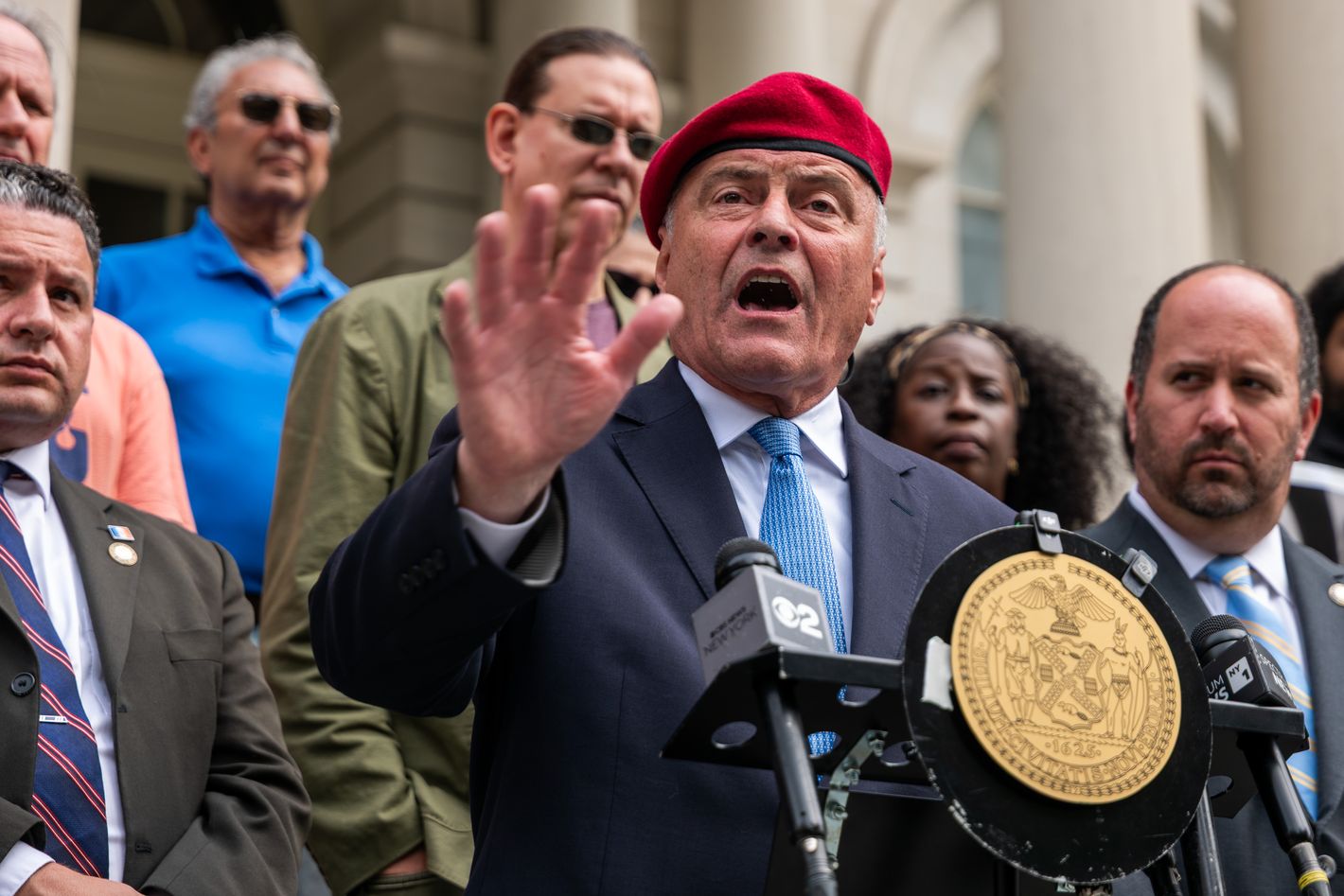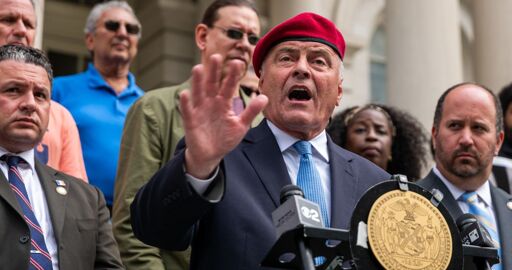
Photo: Spencer Platt/Getty Images
Curtis Sliwa, the Republican candidate making his second run for mayor, is closing out the campaign the way he does everything: with restless energy, a bull-headed refusal to back down, and an endless string of wisecracks and wild, well-told anecdotes and observations accumulated during a lifetime spent roaming the streets of New York. But behind Sliwa’s constant patter is a plan.
“Look, I start with 28 percent from the last election. I don’t think most of them are going to leave me. The Republicans will come home, and I have even more independents than Republicans,” he told me recently. “And now, with the Protect Animals ballot line, first time ever in electoral politics, I figure I’ll get another four or five percent. It’s mostly women. But then I’m a contender.”
At first glance, the political math checks out: The last two Republican candidates for mayor before Sliwa, Representative Nicole Malliotakis and hospital executive Joe Lhota, finished with 28 percent and 24 percent, respectively, against Democrat Bill de Blasio in 2017 and 2013. Assuming a baseline GOP vote of 28 percent or so, there’s good reason for Sliwa to think that hard work and a bit of luck could move him within striking range of the Democratic leader in the race, Zohran Mamdani, who is polling around 46 percent in most surveys.
But Andrew Cuomo, the former governor running as an independent, has complicated matters by making steady, stealthy overtures to Republican voters, and picking up significant support after Mayor Eric Adams quit the race. And Sliwa’s efforts to consolidate Republican support took a hit last month when President Donald Trump made dismissive remarks about him on Fox and Friends.
“Look, I’m a Republican, but Curtis is not exactly prime time,” Trump said. “He wants cats to be in Gracie Mansion … We don’t need thousands of cats.”
Sliwa, who is married to an animal-rescue activist, shrugs off the mockery.
“Please, Mr. President, don’t say any nice things about me. Be Switzerland, be neutral, stay out of this race,” he said. “You can’t help, you can only hurt. New York City is not Trumpland. Everywhere I go, and I’ve been in all 350 neighborhoods, he has pockets of support, but I’m gonna win them anyway.”
Sliwa’s efforts have been further impaired by pro-Cuomo independent political committees that are spending millions on ads warning voters that electing Mamdani, a democratic socialist, would be an existential threat to life in New York. Pressure on Sliwa to drop out of the race and support Cuomo has been intense, and recently led to threats sufficiently credible that Sliwa has hired armed security to guard him and his wife.
“You gotta understand, I’m a guy who was targeted by the Gottis and Gambinos and shot five times with hollow point bullets. I never had armed-security,” he told me. “Obviously, the rhetoric is way too high; Zohran Mandami is getting all these threats. We need to lower it. Let the people decide the election.”
Sliwa’s goal is to create an urban Republican movement that is not socially conservative or pro-Trump, but pro-business, tough on crime and welcoming to communities of color. He made the point by opening a campaign office in Brownsville, Brooklyn, a low-income neighborhood that has been a Democratic stronghold for generations. Walking a single block with Sliwa took 10 minutes, as Black and Latino residents stopped him for selfies, chitchat, and promises to vote for him. One bus driver even stopped in traffic, honked and waved Sliwa on board so he could make a quick pitch to passengers.
Setting up shop in Brownsville was a homecoming of sorts for Sliwa, who lived near the corner of Hegeman Avenue and Osborn Street from 1974 to 1976 after getting expelled from Brooklyn Prep, a Catholic high school for boys. Sliwa, the class president, had organized protests against the school’s jacket-and-tie dress code; the Jesuit priests who ran the school were not amused.
“Boy, that was an experience, the only white guy there, married to Koren Drayton at the time. I couldn’t go back to Canarsie because I was married to a Black woman, and the brothers were like, why are you coming into our community, snacking on our women. I was damned if you do, damned if you didn’t. And then I moved to the Bronx. I figured, hey, the Bronx will accept me. And they did, because the Bronx was burning and I ended up becoming a night manager at Mickey D’s.“
It was at McDonald’s, besieged by crime, that Sliwa organized his overnight shift workers into a safety patrol called the Magnificent 13, later renamed the Guardian Angels, that adopted uniforms and began doing literal hand-to-hand combat against muggers and gang members on streets and subways. Decades later, says Sliwa, “I can go into neighborhoods where the only Republican they’ve ever seen is Abraham Lincoln on a five-dollar bill and be accepted because of the work I’ve done with the Guardian Angels.”
The street-patrol veteran says that, if elected, he would hire 7,000 additional cops, hike their pay, and revive the NYPD’s Homeless Outreach Unit. “When Bill de Blasio and the city council pulled a billion dollars out of the budget for the police in the summer of 2020, they disbanded this great unit. They knew the clients,” he told me. “They would go into the homeless shelters. They’d speak with the directors, the security, speak with community leaders. Once they disbanded that, they left it to the local precinct, men and women who are not trained to deal with that. It takes a very strong skill level.”
On the subways, says Sliwa, “I cannot comprehend why they are not putting police officers on the moving trains,” roaming from car to car rather than standing on the platform. He would also implement crackdowns on shoplifting and public weed smoking.
And far from focusing exclusively on public safety and quality of life, Sliwa wants to encourage homeownership as a way to build wealth and stability in low-income neighborhoods, including by refashioning public housing developments as resident-owned co-ops. On education, economic development and other topics, he said he’d consult with experts and frontline city workers to find strategies to build the middle class.
“I would have a totally transparent administration. The good but also the bad and the ugly,” he told me. “The other thing I would elevate are the civil servants, many of them who have served for Democrats and Republicans. They’re the silent number of people who keep the government going, because elected officials, I don’t care if they’re Republicans or Democrats, they’re too busy dialing for dollars. The staff does all the work. They never get put on a pedestal. They’re never given an opportunity of exposing great ideas.”
It’s the kind of practicality you’d expect from a man who dropped out of high school but now wants to run the nation’s largest education system. “As mayor, I would sit back, I’d analyze, I have to sign off on it,” he told me. “I’d say, ‘You, George, you’re the one who was the architect of this. You’ve been a correctional officer for 32 years, you know the system inside out. I want you to give the press conference and explain how this works.’ Wouldn’t that be a novel idea?”
From Intelligencer - Daily News, Politics, Business, and Tech via this RSS feed

